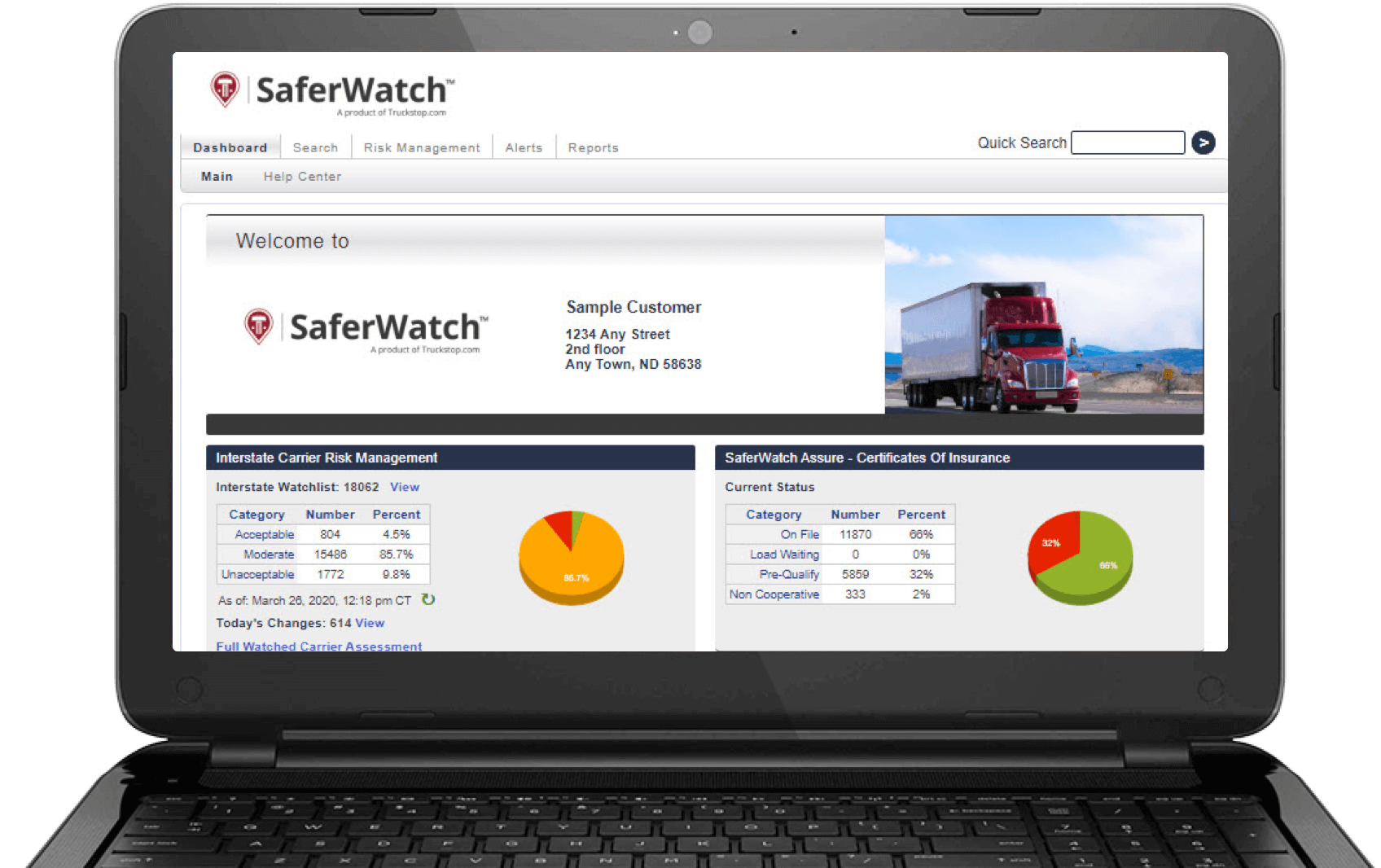3 Benefits of Carrier Compliance & How to Track It

Onboard with confidence
Take a deep dive into risk mitigation for freight brokers.
Technology is transforming the logistics space, including monitoring shipments from origin to destination. The visibility in the monitoring of shipments helps hold vendors and suppliers accountable for freight-related carrier violations.
However, growth in the logistics industry means that most shippers use several carriers, often depending on what they need to ship at the time. Larger carriers often conduct internal monitoring that can be shared with shippers and brokers. But carrier compliance violations can happen, and each of those violations comes with a cost. For these reasons, it’s critical to monitor compliance regulations and keep up with trends in the industry.
What is motor carrier compliance, and what does it mean to shippers and brokers?
What is carrier compliance?
Carrier compliance means holding carriers to an industry standard that ensures they deliver freight on time, free of damage, and without physical or financial harm to others in the supply chain. You usually accomplish this by implementing an inbound freight routing guide that carriers and shippers are expected to follow.
Carriers can and should be held responsible for damage, the costs associated with late shipments, and any other expenses that result from their actions. Enforcing carrier-compliance violation fees incentivizes carriers to meet standards and expectations.
Why carrier compliance is important

Carrier compliance is important for a variety of reasons. Rapid industry growth and the variety of shipping options increase the number of carriers that might not be in compliance. If brokers are not careful they might unwittingly end up dealing with them. Using a non-compliant carrier is risky. It potentially puts the broker at risk of litigation. This is especially true in the event of an accident that could have been prevented if the broker checked and monitored compliance. It can also be quite costly in other ways, delay shipments, compromise company assets, and damage a broker’s reputation with both suppliers and customers.
Large retailers and other shippers understand the impact of these penalties and other costs from carrier compliance violations and are likely to enforce them strictly. Studies show that larger carriers are more compliant with safety regulations than smaller ones for a variety of reasons, including fear of retaliation by suppliers. Retaliation can include raising shipping and wholesale prices. Small shippers might also work with only a few suppliers because they don’t have access to larger ones or a greater variety of shipping options, or they don’t have time to follow up on the enforcement process, among other issues.
One key to improving carrier compliance (and the industry as a whole) is consistency. How is compliance monitored and enforced?
How the FMCSA monitors carrier compliance
A partial answer is the Federal Motor Carrier Safety Administration (FMCSA) and their Compliance Safety and Accountability (CSA) program. Seeing the need for more universal standards for carriers and drivers, the CSA program established seven areas, or data points, they use to score compliance. The higher the CSA score, the worse the carrier’s safety record.
- Unsafe driving: This includes dangerous activities such as speeding, improper lane changes, seat belt violations, and much more. These violations impact Safety Measurement System results for 24 months.
- Crashes: This data includes all state-reported crashes.
- Hours of service (HOS) compliance: Drivers must comply with DOT regulations and not engage in impaired or fatigued driving.
- Vehicle maintenance: This data point ensures that vehicles adhere to all maintenance schedules to ensure safety.
- Controlled substance/alcohol: Drunk or impaired driving involving alcohol, drugs, or misuse of prescription drugs causes companies to lose points (It’s typically a zero-tolerance issue for individual drivers).
- Hazardous materials compliance: Carriers are rated on the safe or unsafe handling of hazardous materials.
- Driver fitness: Carriers must ensure vehicles operated by unfit drivers or they will have points deducted from their overall score. (Drivers who are untrained, unlicensed, etc.)
Both shippers and carriers can find more information on these areas and what CSA scores look like by visiting the FMCSA website and checking out the CSA-specific guidelines.
What do the CSA-specific guidelines mean to brokers working as intermediaries between carriers and shippers? Brokers should also be looking at carrier compliance and reputation whenever possible. When you select carriers, look at CSA scores, enforce carrier compliance, and refuse to work with carriers who are habitually not in compliance or have poor CSA scores.
In the long run, carrier compliance benefits brokers, shippers, and carriers. What are some of those benefits?
Three key benefits of carrier compliance
Carrier compliance comes with many benefits for the entire logistics industry, specifically brokers and shippers. There’s no downside to motor carriers, shippers, and suppliers staying within the very reasonable guidelines set forth in CSA documentation. Here are a few of the most important benefits.
Compliance creates a competitive advantage.
It should go without saying that a better reputation gives shippers a competitive advantage. The same can be said for a broker who screens carriers for compliance. Shippers are more likely to work with brokers who supply safe, on-time carriers that follow the rules of the road. High carrier CSA scores can help brokers earn more contracts.
When carrier compliance issues have plagued a carrier in the past, shippers may choose a broker based on reputation above price. Keeping your reputation as a broker solid and your bids competitive can even allow you to charge slightly higher rates.
Improve broker-carrier-shipper partnerships
Better broker relationships with shippers mean more business, a steady variety of loads the broker can offer the carriers they work with. In turn, this means more carriers will trust you as a broker to provide them with steady loads. This is another reason it is important for brokers to monitor carrier compliance.
Ongoing partnerships and repeat customers help to stabilize your business and your profits. But there is another benefit. Word of mouth is still the best type of marketing. Good relationships make it more likely shippers will recommend you to their colleagues as well. Good partnerships also make work more pleasant and less stressful. It’s easier to work with people you like and trust!
Provide greater transparency.
As the logistics supply chain becomes more visible end to end, it is more important than ever to maintain transparency when it comes to compliance and safety issues. Being transparent directly affects your partnerships and your reputation as a broker. Customers have come to expect this kind of end-to-end visibility from modern logistics companies. As a broker, you’re expected to facilitate that visibility as part of each transaction.
Like maintaining good relationships, providing greater transparency to your shippers and carriers makes your overall job less stressful. Everyone can see what’s happening in real-time and why delays or other events might occur. You can also better spot and correct potential violations ahead of time.
What is the easiest way to make transparency part of your business? Using a Transportation Management System (TMS) is a good option. These systems track FMCSA and CSA scores, deliveries in real-time and improve efficiency. This reduces freight costs, provides critical transparency, and can ultimately improve your relationship with shippers and carriers.
As more shippers enforce motor carrier compliance issues and pass along carrier compliance costs, the more incentive carriers will have to comply with higher standards, operate safely, work to prevent any damages, and provide better customer service.
As a broker, high CSA scores and refusing to deal with carriers who have a history of compliance issues mean you can rest assured your shippers are getting the service they deserve.
How to track carrier compliance with SaferWatch®
When it comes to compliance, you want to use tools that are both easy to use and increase efficiency. This saves you time and effort chasing down CSA scores and other important data. Enter Truckstop SaferWatch. How does it work?
SaferWatch helps you find, verify, and monitor carriers. Here’s how:
- Search carriers and set automated rules and risk assessment guidelines to filter carriers from the start.
- Get certificates of insurance quickly and request new ones in real-time.
- Find CSA-e percentile scores at a glance so you can do your own risk assessment.
- Identify fraud through verified carrier reviews.
- Monitor compliance from all of your carriers by keeping track of safety and insurance over time.
Want to learn more? Check it out and set up a demo.
Carrier compliance and violation fees drive up freight costs for everyone. By monitoring CSA scores, enforcing standards, and using that information as leverage, brokers can help shippers better control inbound shipping costs. Brokers are encouraged to do this by making connections with verified and compliant carriers.
Topics:
Get helpful content delivered to your inbox.
Sign up today.
Find high-quality loads fast, get higher rates on every haul, and access tools that make your job easier at every turn.






